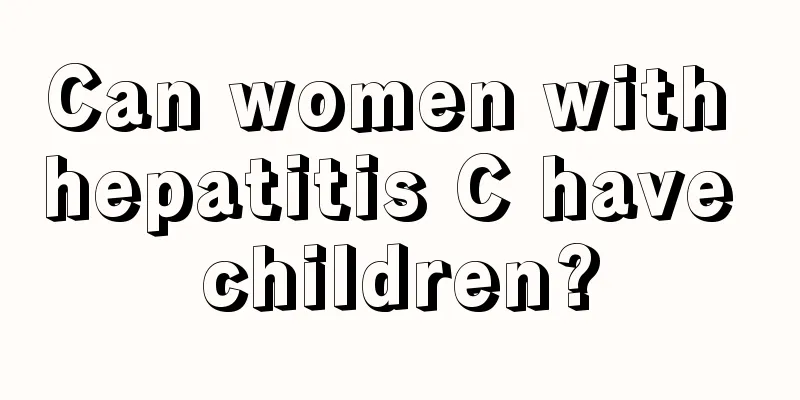Can women with hepatitis C have children?

|
Hepatitis C is a type of viral hepatitis. Like hepatitis B, hepatitis C is contagious. Many women are concerned about whether patients with hepatitis C can have children. It is possible to have children with hepatitis C, but it will affect the fetus. In this case, it is generally recommended to receive treatment first and then prepare for pregnancy. 1. Women with hepatitis C can have children, but because taking medication after pregnancy can have a serious impact on the fetus, it is recommended to receive treatment first and then consider pregnancy and childbirth. If a woman has hepatitis C, the hepatitis C virus will reside in her body for a long time, causing a certain degree of damage to the liver. Pregnancy itself will also increase the burden on the liver. In addition, she must be very cautious about taking medications during pregnancy. If a woman becomes pregnant when her condition is unstable, it will be extremely detrimental to her condition and liver. 2. Hepatitis C, like hepatitis B, is an infectious disease, one of which is mother-to-child transmission. It can also be transmitted through blood and sex. It is not a genetic disease. The chance of mother-to-child transmission of hepatitis C is low. If the hepatitis C RNA test is negative, it means that you are in a stable state and you can consider pregnancy. However, if the test result is anti-HCV positive, it is recommended to become pregnant and have a baby after hepatitis C is cured, which will be better for the health of both the mother and the baby. Regardless of your hepatitis C status, it is recommended that you get treatment first before getting pregnant. 3. If a woman with hepatitis C gives birth to a child, it is very likely that the hepatitis C virus will be transmitted to her offspring, affecting the health of the newborn. People with hepatitis C can have children, but for the sake of their offspring and their own health, it is best for hepatitis C patients to receive treatment before considering having children. If a mother with hepatitis C wants to know whether her newborn is infected with the hepatitis C virus, she can test the child for hepatitis C antibodies and hepatitis C virus load six months after the child is born. If both the antibodies and the virus load are positive, it most likely means that the child born to the mother with hepatitis C is infected with hepatitis C, otherwise, the child is not infected with the hepatitis C virus. |
<<: What causes irregular menstruation after sexual intercourse?
>>: What should I do if I catch a wind-heat cold during breastfeeding?
Recommend
Can I breastfeed if I have a fever due to mastitis?
Generally, mastitis often occurs during breastfee...
Placenta previa bleeding at home
Women may experience placenta previa during pregn...
Does sugar cane reduce internal heat? Are there any benefits to eating sugar cane?
It's the season to chew sugarcane again! Raw ...
Why do you have abdominal pain during early pregnancy?
The little life begins to grow in the belly, whic...
What does the female hormone test include?
The female physiological system is very complex, ...
How can I recover after the confinement period?
Women need to stay in confinement after giving bi...
Why pregnant women are always thirsty
Pregnant women will always experience various sym...
Health Preservation in the Beginning of Spring
The Beginning of Spring is one of the 24 solar te...
What to do if your vulva is burning
Female reproductive organs can be divided into se...
What are the best ways to get rid of vaginal odor?
Female friends should pay attention to the fact t...
The new mutant virus has spread to many countries. Can we still go home for the Spring Festival?
Recently, the emergence of the new variant Omicro...
Mobilewalla: The number of smartphone apps worldwide is expected to exceed 1 million by mid-December 2011
According to foreign media reports, the latest re...
WHO declares monkeypox no longer a "public health emergency of international concern"
World Health Organization Director-General Tedros...
Immunohistochemistry results
Immunohistochemistry is a detection method that i...









